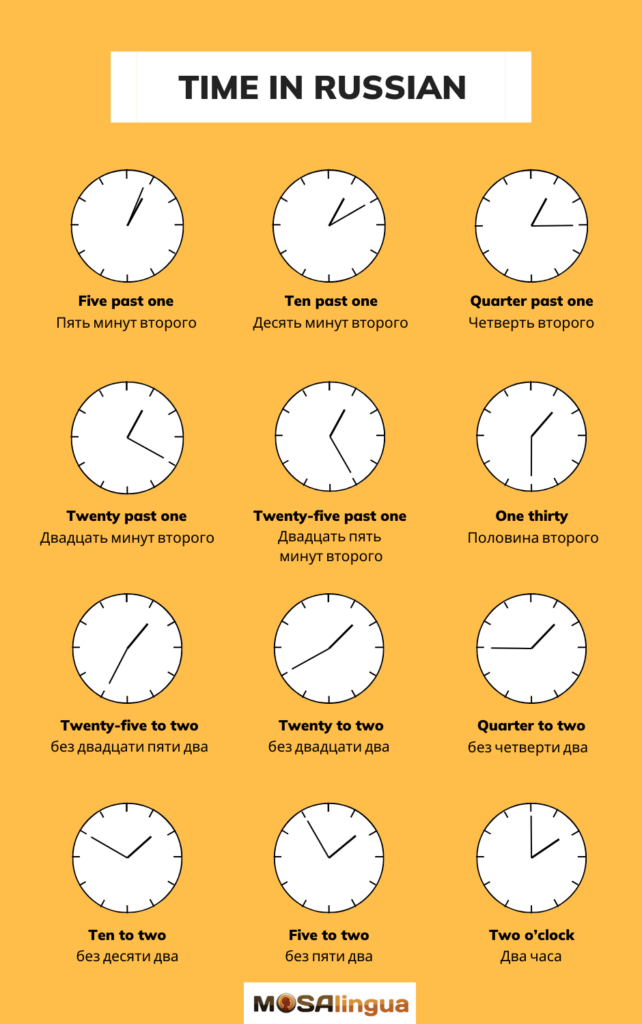When you’re learning Russian, it’s essential that you learn how to tell time. It’s a practical skill that will help you converse freely when you’re speaking Russian. In this article, we’ll teach you how to tell time in Russian and how to correctly write the time, as well. Don’t worry! Although it might seem hard at first, we promise that with a little practice, you’ll be telling time in Russian like a pro.

Tell Time in Russian, The Easy Way!
Кото́рый час?
By the end of this article, you’ll be capable of understanding and replying to this question in Russian—it literally means “What time is it?” and it’s pronounced ka-tó-ryj chas?
Listen and repeat 🔈:
That expression is on the polite, formal side, but there’s another more common and informal way to ask for the time in Russian: Сколько времени? (pronounced skól-ka vryé-mye-ni?).
Listen and repeat 🔈:
Now, learn how to answer it!
Hours on the dot
There are two ways to tell time in Russian.
Today we’ll learn the simple way, which is a bit easier for beginners.
But before we do that, you’ll need to know the numbers in Russian. Here are the numbers from 1-12:
| Number | Russian | Transcription | Pronunciation |
|---|---|---|---|
| 1 | один | odìn | |
| 2 | два | dva | |
| 3 | три | tri | |
| 4 | четыре | chetyre | |
| 5 | пять | piatt | |
| 6 | шесть | chest | |
| 7 | семь | siem | |
| 8 | восемь | vosiem | |
| 9 | девять | dieviat | |
| 10 | десять | dieciat | |
| 11 | одиннадцать | adinatsat | |
| 12 | двенадцать | dvenatsat |
Once you know the numbers in Russian, you’re ready to start telling the time!
Here’s the simple formula for telling time in Russian: if it’s an exact hour (such as 2 o’clock), simply use a number from 1 to 12 and add the Russian word for “hours.”
In other words, the translation for “it’s 2 o’clock” is, literally, “2 hours.”
The singular Russian word for “hour” is час (pronounced chas).
This word is also used to say “It’s one o’clock.” (In other words, when you need to say “It’s one o’clock”, you don’t follow the formula above. For every other time, you do.)
For the rest of the hours, follow this formula: number + “hours” (часа). The plural word for “hours” is часа, pronounced cha-sá.
But be careful! If you’re using a number from 2 to 4 you say часа, and from 5 onwards, you say часов (cha-sóf).
Let’s look at a few examples:
- It’s 1 o’clock = Час (chas)
- It’s 3 o’clock = Три часа́ (tri cha-sá)
- It’s 4 o’clock = Четы́ре часа́ (chye-tý-rye cha-sá)
- It’s 5 o’clock = Пять часо́в (pyat cha-sóf)
- It’s 9 o’clock = Де́вять часо́в (dyé-vyet cha-sóf)
Minutes
Like we said in the beginning, today we’re learning about the simple form of telling time in Russian.
Here is the simple structure for telling time in Russian including minutes: number of hours + number of minutes. Easy peasy! Take a look at the following examples:
- It’s 5:15 = Пять пятна́дцать (pyat pyet-ná-tset)
- It’s 5:30 = Пять три́дцать (pyat trí-tset)
Moments of the day
There will be many times when you listen to Russian and, thanks to context, you’ll know if the speaker is talking about a time in the morning, afternoon, or night. But what if you have to specify which moment of the day you’re referring to? In these cases, use the following expressions:
- in the morning = утра́ (u-trá)
- afternoon = д ня (dnya)
- at night = ве́чера (vyé-chye-ra)
- noon = по́лдень (pól-dyen)
- midnight = по́лночь (pól-nach)
Now let’s see how to use these words to refer to a specific moment of the day in context:
- 7 in the morning: семь утра́ (syem u-trá), literally, seven of the morning
- 7 in the evening: семь ве́чера (syem vyé-chye-ra).
As you can see, the structure is very simple. The hardest part is learning the numbers, vocabulary you can memorize easily with our MosaLingua Russian app.
Start improving your Russian today
Good news: we can help!
More good news: you can get started for free! With your free trial, you can test drive the most effective method for learning Russian for the next 15 days!
Vocabulary flashcards, videos with subtitles, audiobooks, articles adapted to your level – with MosaLingua Premium (Web & Mobile), you’ll have access to all this and more. Get started right now. It’s free—and risk-free—to try!
Asking What Time It Is
Now you should feel comfortable telling the time if anyone asks. But what if you, yourself don’t have a watch handy? You already learned one way to ask the time. Here are a few more expressions you can use, depending on the context and who you are speaking to.
Formal situations
If you find yourself in a more formal context, you can use the following expressions to ask the time:
- Вы не подска́жете, кото́рый час? (Vy ne podskázhete, kotóryy chas?) = Could you tell me what time it is?
- Извини́те, не подска́жете, ско́лько вре́мени? (Izviníte, ne podskázhete, skól’ko vrémeni?) = Excuse me, could you tell me what time it is?
- Извини́те, вы вре́мя не подска́жете? (Izviníte, vy vrémya ne podskázhete?) = Excuse me, could you tell me the time?
Informal situations
If you’re addressing a friend or relative, you can use the forms mentioned at the beginning of the article or the following more colloquial expressions:
- У тебя́ есть часы́? (U tebyá yest’ chasý?) = Do you have the time?
- Ско́лько сейча́с вре́мени? (Skól’ko seychás vrémeni?) = What time is it right now?
Sure, nowadays most of us carry a smartphone, and we can just look at the time instead of asking others to help us. But knowing how to properly tell time in Russian is an essential skill, and it will help you feel more comfortable and familiar with the language.
Practice makes perfect!
Next Steps
That’s all for today. If you’re learning Russian and want to improve even more, check out these other articles:
- The Secret to Learning the Russian Alphabet [VIDEO]
- English to Russian: How Great are the Linguistic Differences Between these Two Languages?
- 8 Russian Idioms to Make You a Savvier Speaker
- Is Russian Easy to Learn and Speak? 10 Reasons the Answer Is Yes!




![10 Popular American English Slang Words [VIDEO]](https://www.mosalingua.com/en/files/2017/05/2-300x169.jpg)

Comments